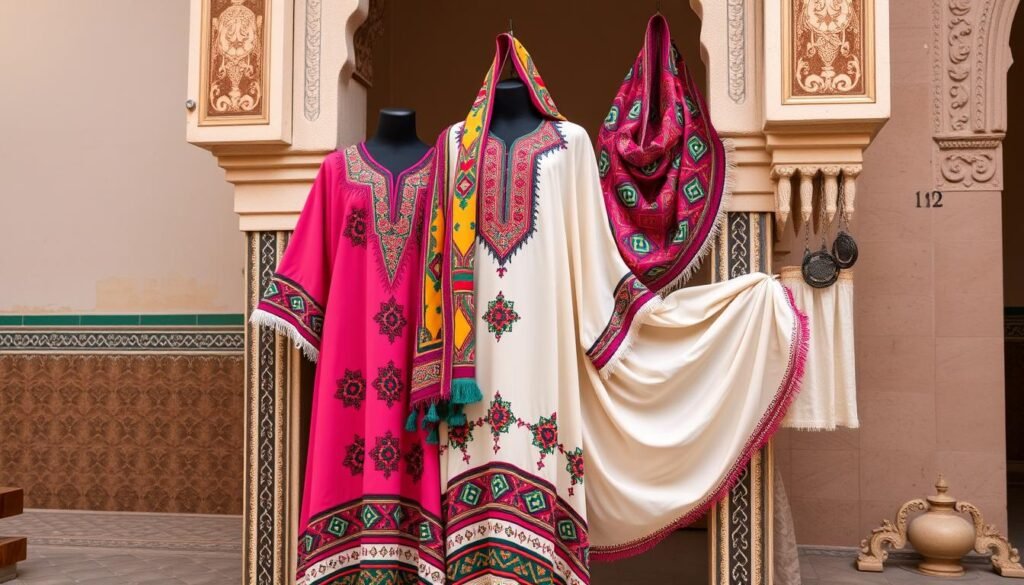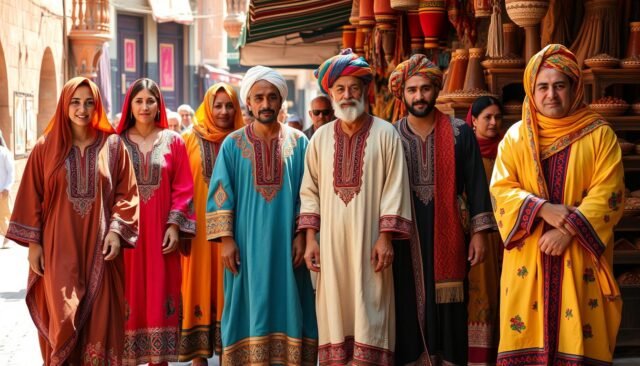Moroccan apparel tells a story of culture, history, and art. It’s more than just clothes; it’s a reflection of heritage. The designs, rich in color and detail, come alive, from bustling markets in Marrakech to modern styles. Let’s explore this world and see why Moroccan fashion is so treasured.
Key Takeaways
- Moroccan apparel reflects a rich cultural heritage and artistic craftsmanship.
- Traditional Moroccan attire is characterized by vibrant colors and unique designs.
- Moroccan clothing is a significant part of the identity for many people.
- The variety in styles showcases the diverse influences in Moroccan fashion.
- Understanding Moroccan apparel helps appreciate its local and international significance.
Introduction to Moroccan Fashion
Moroccan fashion is a beautiful mix of many cultures. It combines Berber, Arabic, French, and Spanish influences. This blend creates a look that is both classic and modern.
Traditional Moroccan clothes focus on being comfortable and true to their roots. Artisans put in a lot of work and care to make these unique pieces. They use bright colors, detailed patterns, and careful handiwork. This makes them popular worldwide.
Moroccan fashion keeps its special character even as trends change. It holds onto its history while adding new styles. This shows Morocco’s rich culture of craft and design. It makes Moroccan fashion stand out in the world.
The Rich History of Moroccan Apparel
Moroccan fashion has a deep story, soaked in the history of many cultures. Its location made Morocco a meeting spot for different societies. These societies included Arabs, Berbers, and Saharans. They all added special touches to Moroccan clothes.
The outfits, textiles, and colors of Morocco stand out. They show the blend of traditions over the ages.
The Influences of Diverse Cultures
The mix of cultures made Moroccan fashion richer. Clothes like the Djellaba are both practical and stylish. Moroccan style is like a colorful cloth, with pieces from many customs.
It uses materials and designs from around the world. This mix celebrates how Moroccan fashion stays true to its roots while being open to new ideas.
Key Moments in Moroccan Fashion History
Moroccan fashion has seen big events shape its journey. The colonial era brought fresh views. It made people mix traditional styles with new trends.
World fashion designers are now drawn to Moroccan elegance, showing it off globally. This mix of past and present shows how adaptable and relevant Moroccan fashion is. Its traditions and modern twist make it a proud symbol of its culture. For more on specific clothes, check out this resource.
Moroccan Apparel: Traditional Fashion Essentials
Exploring Moroccan traditional attire reveals the country’s deep cultural heritage. These clothes are more than fashion. They blend history with personal style. The djellaba, kaftan, and takchita highlight Morocco’s fashion identity.
Understanding Traditional Moroccan Attire
Traditional Moroccan clothes are full of meaning. The djellaba is a comfy, hooded robe for all. The kaftan displays intricate embroidery, a women’s favorite. The takchita, worn at special events, combines layers and vivid fabrics. These garments tell the culture’s stories and connect people to their roots.
Essential Elements of Moroccan Style Clothing
Moroccan fashion is known for its stunning details. Important features include:
- Intricate Embroidery: Handcrafted designs showcasing local skill.
- Vibrant Textiles: Bright colors and textures make the outfits pop.
- Unique Patterns: Fabric patterns that narrate tales.
- Fabric Choices: Silk, wool, and cotton are key, offering comfort and a nod to natural resources.
- Cultural Significance of Colors: Each color has a symbolic meaning connected to Moroccan life.
Moroccan apparel is gaining global recognition. The craftsmanship and creativity in these clothes go beyond mere fashion. They symbolize a deep connection to cultural identity and values. To understand more, visit this link.
| Garment | Description | Common Uses |
|---|---|---|
| Djellaba | A long, hooded robe suitable for everyday wear. | Casual outings, family gatherings. |
| Kaftan | Embellished garment that symbolizes elegance and grace. | Weddings, formal events. |
| Takchita | Layered dress often worn for special occasions. | Cultural festivities, special ceremonies. |
Through Morocco’s history and natural beauty, its traditional attire remains important. Each piece has a story, earning both respect and love.
Popular Types of Moroccan Clothing
Moroccan clothing showcases a rich tapestry of culture and elegance. The Moroccan kaftan is a timeless classic. It’s loved for its beauty and versatility. The variations in design offer unique looks. They combine tradition and modern style. Moroccan dresses come in many styles. The takchita is stunning and reserved for special occasions. Looking at Moroccan ethnic wear gives insights into the culture of Morocco.
Moroccan Kaftans: A Timeless Classic
Moroccan kaftans symbolize grace and style. They’re often worn at formal events. Designed for comfort, they have flowing silhouettes, intricate embroidery, and vibrant colors. The versatility of Moroccan kaftans allows different styling options. They are a staple in traditional Moroccan attire.
Moroccan Dresses: Styles and Variations
The realm of Moroccan dresses is vast. The popular takchita consists of two pieces that exude elegance. Worn at weddings or significant ceremonies, these dresses show off artistic craftsmanship. They’re adorned with sequins and beads. Different fabrics add to their beauty, connecting tradition with modern fashion.
Exploring Moroccan Ethnic Wear
Moroccan ethnic wear includes traditional garments for various occasions. From the colorful djellaba to embellished jellabas for special events, these pieces show Morocco’s cultural diversity. Each region offers unique garments. They highlight the heritage and craftsmanship in Moroccan apparel.
| Type of Moroccan Clothing | Description | Occasions |
|---|---|---|
| Moroccan Kaftans | Flowing garments with elegant designs | Formal events, celebrations |
| Moroccan Dresses | Includes styles like the takchita | Weddings, ceremonies |
| Moroccan Ethnic Wear | Traditional garments reflecting cultural diversity | Festivals, daily wear |
Choosing the Perfect Moroccan Attire
When you’re picking out Moroccan clothing, you need to think about the fabric, color, and accessories. The right choices bring out the beauty of the outfit and show off your style. Let’s dive into what makes Moroccan fashion stand out.
Fabric and Color Choices
The fabric of Moroccan clothes greatly affects how they look and feel. Here are some popular materials:
- Silk: It shines and feels soft, making it perfect for fancy events.
- Wool: Great for cold weather, it’s warm and lasts a long time, often used in winter wear.
- Cotton: It’s airy and flexible, ideal for everyday outfits in warm weather.
Moroccan culture also values certain colors for their meanings. For example:
| Color | Significance | Occasions |
|---|---|---|
| Red | Stands for strength and bravery. | Used in weddings and celebrations. |
| Blue | Means calmness and peace. | Good for casual wear. |
| Green | Represents growth and life. | Suitable for religious events. |
| Yellow | Symbolizes joy and happiness. | Perfect for festivals and parties. |
Accessories to Complement Your Look
Accessories are key to completing your Moroccan outfit. Adding special pieces can make your traditional look even more beautiful:
- Jewelry: Fancy silver and gold items, like necklaces and earrings, boost the elegance of any dress.
- Footwear: Babouche slippers, decorated with details, are both comfy and stylish.
- Headpieces: Scarves or detailed headdresses bring a classic feel to your outfit.
Wearing Moroccan Apparel for Different Occasions
Moroccan clothing is great for any event or time. Knowing how to style it makes you look good and respect culture. Here are some tips for wearing these pretty outfits right.

For casual outings, try a loose Moroccan shirt with tapered pants. It’s comfy and stylish, perfect for hanging out. A light kaftan is great on warm days, offering coolness and style.
For formal events, go for something more fitted. A fancy embroidered kaftan with a belt looks smart. Add heels and big accessories for a complete, elegant outfit. It’s important to match the dress code, especially at weddings, to honor the culture.
Festivals and celebrations call for bright colors and detailed designs. Pick outfits with rich fabrics and add headscarves or turbans. This shows you’re joining in the fun and respecting traditions.
Everyday wear is about comfy style. Mix Moroccan clothes with modern items like jeans and a traditional babouche. This blend shows off Moroccan fashion and makes your look unique.
| Occasion | Recommended Attire | Accessories |
|---|---|---|
| Casual Outings | Loose-fitting Moroccan shirt + Tapered pants | Minimalist jewelry |
| Formal Events | Embroidered kaftan + Tailored pants | Elegant heels, statement pieces |
| Festivals | Vibrant kaftan + Headscarf | Colorful accessories |
| Everyday Wear | Traditional babouche + Denim | Crossover bags |
Enjoy the beauty of Moroccan clothes for all times while honoring the culture. Picking the right outfits and accessories lets you mix tradition and modern fashion easily. Adding Moroccan items to your closet lets you honor and celebrate this colorful culture stylishly.
Conclusion
Moroccan apparel is a celebration of the country’s rich culture and vibrant legacy. It shows off the beautiful, complex patterns and elegant kaftans. Each piece of clothing has its own story, full of history.
It’s more than just an outfit. It’s a marker of identity and tradition. This fashion wins hearts worldwide, showing the power of Moroccan style.
Imagine adding Moroccan fashion to your own style. You do more than just look unique. You connect with a story that praises cultural diversity.
Moroccan attire is about embracing a special look. But it’s also about connecting to a larger, worldly narrative. It invites us to cherish cultural artistry.
In ending, let Moroccan fashion open your eyes to new fashions and ideas. Adding it to your closet does more than update your look. You hold onto a piece of its heritage.
This heritage shines through its beauty and craftsmanship. It brings different cultures together in unity. So, as you pick Moroccan pieces, you celebrate more than fashion. You honor a rich history of connection and creativity.










